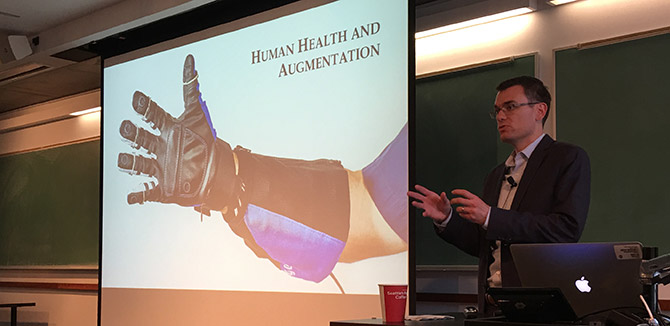Understanding the Role Robots Play at NASA
MSR students hear from Dr. Joshua Mehling (BS ‘03, MS ‘04), technical discipline lead for robotic controls at NASA’s Johnson Space Center
The history of NASA and robots goes back decades. As artificial intelligence and robotics continue to occupy a more prominent role in everyday society, their importance for NASA (both on Earth and in space) is unquestioned.
Dr. Joshua Mehling (BS ‘03, MS ‘04), the technical discipline lead for robotic controls at NASA’s Johnson Space Center, recently spoke with students in Northwestern Engineering’s Master of Science in Robotics program about the role robots play for NASA today, and how that will continue to evolve in the coming years.
Current MSR students Ben Don and Drew Warren spoke about what they learned during Mehling’s talk and the inspiration they got from his presentation.
Why were you interested in attending this event?
BD: Previously, I had read about the NASA/GM collaboration on Robonaut 2 (R2) in the book "Programming Robots with ROS: A Practical Introduction to the Robot Operating System". As a previous employee of GM and humanoid robot enthusiast, this did not seem like an event to pass up since Josh worked on both Robonaut and Robonaut 2.
DW: I was interested in attending the event because I've been an amateur follower of NASA's research for a long time. I grew up in Texas and have visited the Johnson Space Center a few times, and it's a cool place. When I was in high school, I did a course through NASA that ended with a week-long event at JSC, where I got to tour even more of the facility and hear a talk from astronaut Fred Haise. Then in my undergraduate degree, I participated in an intercollegiate competition focused on designing, building and operating a Mars rover through a group called the Mars Society. I think that my interest in NASA is one of the main reasons I pursued studies in a STEM field.
What is one interesting thing you learned from Mehling’s presentation?
BD: It was great to hear how NASA defines the term "robot". I think as a field, we struggle to draw a metaphoric line in the sand about what is and isn't a robot. Does it need a head and arms? Should it be fully autonomous or just a tool? From what I absorbed in the talk, the types of robots Josh works on are collaborative robots. They do the jobs alongside astronauts. It doesn't sound like they are trying to replace astronauts, just make their jobs easier.
DW: Even though you don't see as much publicity for NASA in the web (compared to companies like Boston Dynamics and Waymo), I think NASA's robotics research is taking very efficient steps at solving very difficult problems.
What surprised you most about how NASA uses robots?
DW: I was very interested to see that, in the current tech industry where everyone is talking about AI and getting robotics to solve problems autonomously, NASA was working on solutions that still had partial human operator processes. Josh showed us one project where they have the robot autonomously scan and sense its environment, and then a human operator labels objects in the environment more reliably than current AI systems.
BD: I was surprised to hear the technology that makes the Baxter/Sawyer robots from Rethink Robotics safe to work near as a human (i.e. Series Elastic Actuators) came from NASA originally. In the MSR program, we get lots of opportunities to work with these robots first hand.
How do you think you'll be able to incorporate what Mehling talked about into your own experience in the MSR program?
BD: It appears that Robot Operating System (ROS) is a key component to robotics within NASA, and as such, I will continue to work on finding more projects here to improve my skills with ROS since it does seem like a good skill for my future career aspirations.
DW: If an experienced research organization uses ROS to solve it's varied and complicated problems, I can benefit from improving my knowledge of the system.


